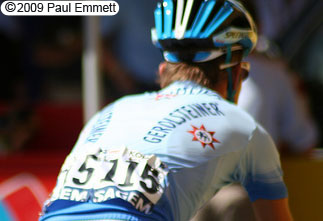 Disgraced Tour de France cyclist Bernhard Kohl said Friday that scientists working in laboratories accredited by the World Anti-Doping Agency (WADA) were bribed by his former manager, the alleged head of a doping network.
Disgraced Tour de France cyclist Bernhard Kohl said Friday that scientists working in laboratories accredited by the World Anti-Doping Agency (WADA) were bribed by his former manager, the alleged head of a doping network.
Austrian Stefan Matschiner, who managed the careers of several top Austrian athletes including Kohl, is accused of organising an elaborate doping network which helped top athletes in Europe to cheat by using performance-enhancing drugs and methods.
Former Gerolsteiner rider Kohl was revealed as a drugs cheat and banned for two years shortly after his astonishing third place finish in last year’s Tour de France where he also won the coveted climbers’ prize of the polka dot jersey.
Matschiner, who has already admitted to performing irregular blood transfusions for Kohl, claimed in a recent interview with German television ARD that he was able to corrupt employees at several WADA-accredited laboratories based in central Europe.
The public prosecutor’s office in Vienna responded by demanding he be brought to a new hearing.Now retired from the sport, Kohl appeared to back up those revelations when he said Matschiner paid between 150 and 500 euros a time to laboratory employees for the testing of samples so that his athletes could avoid being caught by anti-doping tests.
“Matschiner would have our samples analysed so we could find out exactly how far we could go (with drugs) without being caught,” Kohl told the Kurier newspaper.
Kohl said he personally benefited from two tests, one following his use of the blood booster EPO (erythropoietin), another for testosterone – both banned products.
“That way you find out exactly how much you could take at night to avoid being detected the next day,” added the Austrian, who was caught for using a later generation of EPO called CERA which was previously thought undetectable.
Matschiner, who was arrested in March but later released, is seen as a key figure in a doping affair which has taken on immense proportions in Austria.
He reportedly had close ties with former nordic skiing coach Walter Mayer, who was involved in the 2006 Turin Olympics doping scandal, and the Viennese laboratory Humanplasma, which has repeatedly come under scrutiny for irregular practices. Austria embarked on a major anti-doping clean-up in March with a series of arrests, including that of Mayer, cyclist Christof Kerschbaum and a Vienna pharmacist and doctor believed to have supplied banned substances to athletes.